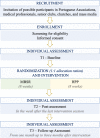The MEDITAGING study: protocol of a two-armed randomized controlled study to compare the effects of the mindfulness-based stress reduction program against a health promotion program in older migrants in Luxembourg
- PMID: 38082350
- PMCID: PMC10714656
- DOI: 10.1186/s12889-023-17387-9
The MEDITAGING study: protocol of a two-armed randomized controlled study to compare the effects of the mindfulness-based stress reduction program against a health promotion program in older migrants in Luxembourg
Abstract
Background: Migration is a phenomenon worldwide, with older migrants, particularly those with fewer socioeconomic resources, having an increased risk of developing adverse cognitive and health outcomes and social isolation. Therefore, it is of utmost importance to validate interventions that promote healthy aging in this population. Previous studies have shown a positive impact of mindfulness based-stress reduction (MBSR) on outcomes such as cognition and sleep. However, only a few studies verified its potential in older adults, especially with vulnerable populations such as migrants. This article presents the protocol of the MEDITAGING study, which is the first to investigate the MBSR effects in migrants aged ≥55 in comparison to a health promotion program.
Methods: MEDITAGING is a two-arm randomized, double-blinded, controlled study, which will include older Portuguese-speaking migrants (n = 90). Participants are randomized to the MBSR or a health promotion program. Both interventions are conducted in groups over a total of 8 weeks, incorporating weekly meetings, an additional 4-hour class, and extra at-home tasks. The health promotion program has the same structure as the MBSR but comprises different activities related to dementia prevention, healthy habits, cognitive stimulation, sleeping, nutrition, watercolor painting, and physical activity. The assessment of executive functioning, physiological stress measures, self-reported questionnaires, and qualitative interviews are conducted at baseline, after 8 weeks (post-intervention), and at a follow-up session (from one to 3 months thereafter). Analyzes will be conducted using a modified intention-to-treat approach (all participants with at least 3 days of participation in the group-sessions and one post-intervention observation).
Discussion: This study will test effects of a mindfulness-based intervention against an active control condition in older adult migrants, which few studies have addressed.
Trial registration: ClinicalTrials.gov NCT05615337 (date of registration: 27 September 2022; date of record verification: 14 November 2022).
Keywords: Health promotion program; MBSR; Migrant health; Mindfulness-based interventions; Older adults.
© 2023. The Author(s).
Conflict of interest statement
The authors declare no competing interests.
Figures
References
-
- Chaves AS, Santos AM dos, Alves MTSS de B e, Salgado Filho N. Associação entre declínio cognitivo e qualidade de vida de idosos hipertensos. Revista Brasileira de Geriatria e Gerontologia. 2015 18(3):545–56 10.1590/1809-9823.2015.14043
-
- Pusswald G, Tropper E, Kryspin-Exner I, Moser D, Klug S, Auff E, et al. Health-related quality of life in patients with subjective cognitive decline and mild cognitive impairment and its relation to activities of daily living. J Alzheimers Dis. 2015; - PubMed
-
- Maleku A, España M, Jarrott S, Karandikar S, Parekh R. We are aging too! Exploring the social impact of late-life migration among older immigrants in the United States. J Immigr Refug Stud. 2022;20(3):365–382. doi: 10.1080/15562948.2021.1929643. - DOI
Publication types
MeSH terms
Associated data
LinkOut - more resources
Full Text Sources
Medical


